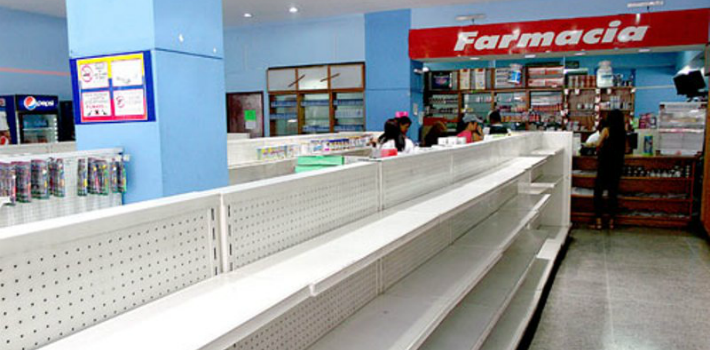
EspañolBesides the lack of basic foods, shortages in Venezuela have critically affected health-care products as well. Approximately 70 percent of essential medicines, and 80 percent of medication for chronic diseases, are disappearing from store shelves, putting millions at risk, according to the NGO Codevida.
This is why Venezuelans take to social media, especially Twitter, to see if a charitable soul either has or knows someone who sells a particular medicine. However, even this desperate strategy is no longer working.
“The problem is that there are no medicines in Venezuela. Not even solidarity on social media is helping now, because they have disappeared from the country’s shelves. We warned that in February and March the situation would be worse,” Francisco Valencia, director of Codevida and a former transplant patient, tells the PanAm Post.
Valencia says that the NGO has been in touch with the Pan American Health Organization (PAHO). Its representative in Venezuela, Celia Riera, has promised to help ease the country’s humanitarian crisis.
The situation has become worse than even in some war-torn countries, Valencia argues.
He says that the international standards set by the World Health Organization compels governments, even those engaged in warfare, to make sure that at least 150 basic medicines are available in the country, such as painkillers, fever reducers, and those for hypertensive disorders.
However, in Venezuela, 70 percent of the items on that list are scarce, he points out.
Children, in Alarming Danger
On Monday, January 25, Cecodap — an NGO that promotes the rights of children and adolescents — filed suit against the Venezuelan Health Ministry over the shortages.
Carlos Trapani of Cecodap asked the courts to demand the immediate provision of essential medicine to all children in state-run health facilities from Health Minister Luisana Melo.

The lawsuit also urges Venezuelan officials to prioritize all children cared for by Siamed, the medicine-distribution system that the Maduro administration created in April 2015 to allegedly speed up the delivery process.
“The court needs to urgently order the provision of medicine that is needed to care for the country’s youth. Demanding medicine is not a luxury; it’s a basic necessity,” Trapani explains to the PanAm Post.
Last week, Health Minister Melo claimed that the shortage was due to Venezuelans “irrationally consuming medication.”
“To suggest that people are hoarding medication,” Trapani counters, “is irresponsible. They evidently buy more than they need, because you never know when you’ll find it again.”
In Cecopdap’s petition, he documents a series of cases where children have died because they couldn’t find the medication they needed in time.
“For the minister, the ‘revolution’ is evidently her priority, not solving the serious shortage. The only irrationality here has been the government in its handling of funds to buy medicine. The comptroller general’s own report says so. Venezuelans are going through enough to have a minister accuse them of causing the shortages,” he says.
Valencia explains that part of the problems lies in the foreign-exchange controls. The Venezuelan government doesn’t have US dollars to sell to pharmaceutical companies, so that they can import the chemicals they need to produce medicine. Furthermore, they have long-standing debts with international suppliers.
[adrotate group=”8″]
Last October, the Venezuelan Federation of Pharmaceutical Industries warned that the shortage was already around 70 percent, most critically with contraceptives, insulin, anti-seizure medicine, high-blood pressure medication, and ointments to treat burns.
The organization’s president, Freddy Ceballos, criticized Venezuelan officials for denying the existence of a problem that affects both private and state-run pharmacies.
 Versión Español
Versión Español












